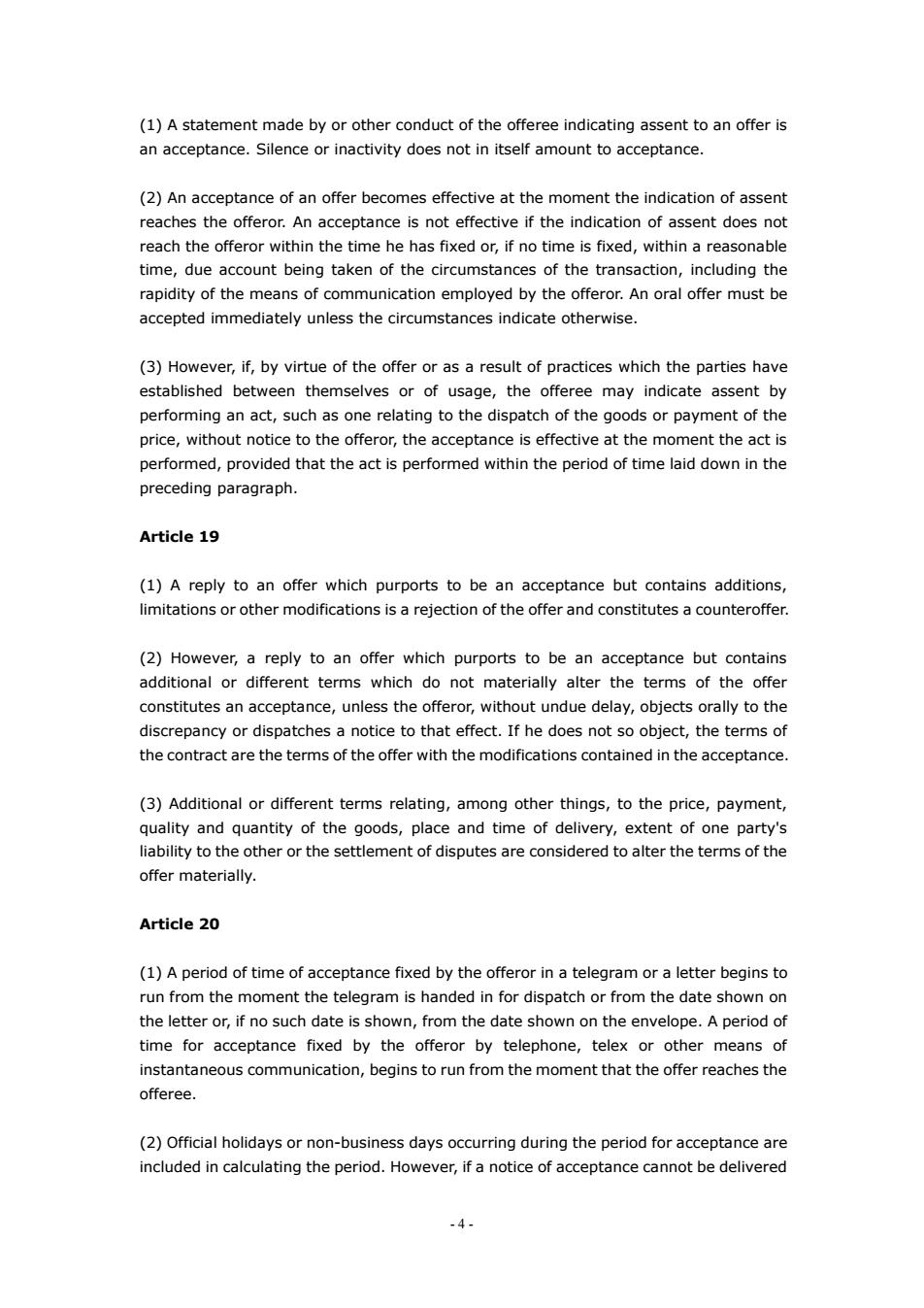正在加载图片...

(1)A statement made by or other conduct of the offeree indicating assent to an offer is an acceptance.Silence or inactivity does not in itself amount to acceptance. (2)An acceptance of an offer becomes effective at the moment the indication of assent reaches the offeror.An acceptance is not effective if the indication of assent does not reach the offeror within the time he has fixed or,if no time is fixed,within a reasonable time,due account being taken of the circumstances of the transaction,including the rapidity of the means of communication employed by the offeror.An oral offer must be accepted immediately unless the circumstances indicate otherwise (3)However,if,by virtue of the offer or as a result of practices which the parties have established between themselves or of usage,the offeree may indicate assent by performing an act,such as one relating to the dispatch of the goods or payment of the price,without notice to the offeror,the acceptance is effective at the moment the act is performed,provided that the act is performed within the period of time laid down in the preceding paragraph. Article 19 (1)A reply to an offer which purports to be an acceptance but contains additions, limitations or other modifications is a rejection of the offer and constitutes a counteroffer. (2)However,a reply to an offer which purports to be an acceptance but contains additional or different terms which do not materially alter the terms of the offer constitutes an acceptance,unless the offeror,without undue delay,objects orally to the discrepancy or dispatches a notice to that effect.If he does not so object,the terms of the contract are the terms of the offer with the modifications contained in the acceptance. (3)Additional or different terms relating,among other things,to the price,payment, quality and quantity of the goods,place and time of delivery,extent of one party's liability to the other or the settlement of disputes are considered to alter the terms of the offer materially. Article 20 (1)A period of time of acceptance fixed by the offeror in a telegram or a letter begins to run from the moment the telegram is handed in for dispatch or from the date shown on the letter or,if no such date is shown,from the date shown on the envelope.A period of time for acceptance fixed by the offeror by telephone,telex or other means of instantaneous communication,begins to run from the moment that the offer reaches the offeree. (2)Official holidays or non-business days occurring during the period for acceptance are included in calculating the period.However,if a notice of acceptance cannot be delivered -4-- 4 - (1) A statement made by or other conduct of the offeree indicating assent to an offer is an acceptance. Silence or inactivity does not in itself amount to acceptance. (2) An acceptance of an offer becomes effective at the moment the indication of assent reaches the offeror. An acceptance is not effective if the indication of assent does not reach the offeror within the time he has fixed or, if no time is fixed, within a reasonable time, due account being taken of the circumstances of the transaction, including the rapidity of the means of communication employed by the offeror. An oral offer must be accepted immediately unless the circumstances indicate otherwise. (3) However, if, by virtue of the offer or as a result of practices which the parties have established between themselves or of usage, the offeree may indicate assent by performing an act, such as one relating to the dispatch of the goods or payment of the price, without notice to the offeror, the acceptance is effective at the moment the act is performed, provided that the act is performed within the period of time laid down in the preceding paragraph. Article 19 (1) A reply to an offer which purports to be an acceptance but contains additions, limitations or other modifications is a rejection of the offer and constitutes a counteroffer. (2) However, a reply to an offer which purports to be an acceptance but contains additional or different terms which do not materially alter the terms of the offer constitutes an acceptance, unless the offeror, without undue delay, objects orally to the discrepancy or dispatches a notice to that effect. If he does not so object, the terms of the contract are the terms of the offer with the modifications contained in the acceptance. (3) Additional or different terms relating, among other things, to the price, payment, quality and quantity of the goods, place and time of delivery, extent of one party's liability to the other or the settlement of disputes are considered to alter the terms of the offer materially. Article 20 (1) A period of time of acceptance fixed by the offeror in a telegram or a letter begins to run from the moment the telegram is handed in for dispatch or from the date shown on the letter or, if no such date is shown, from the date shown on the envelope. A period of time for acceptance fixed by the offeror by telephone, telex or other means of instantaneous communication, begins to run from the moment that the offer reaches the offeree. (2) Official holidays or non-business days occurring during the period for acceptance are included in calculating the period. However, if a notice of acceptance cannot be delivered